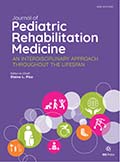Authors: Pineda, Roberta | DeGaetano, Sara | Kindra, Margaret | Hand, Theresa | Craig, Jenene | Fernandez-Fernandez, Alicia | Collette, Debra
Article Type:
Research Article
Abstract:
BACKGROUND: Although considered an advanced area of practice, there has been insufficient standardization in clinical training and preparedness for occupational therapists (OTs), physical therapists (PTs), and speech-language pathologists (SLPs) practicing in the neonatal intensive care unit (NICU). The first step in developing a neonatal therapy certification process was to conduct a practice analysis. PURPOSE: To describe: 1) the collection of OTs, PTs, and SLPs working in NICUs, 2) educational and professional preparation to practice in the NICU, and 3) interest in neonatal therapy national certification. METHODS: An online survey of 468 neonatal therapists
…was completed in 2015–2016. RESULTS: There were 208 (47%) participants who were OTs, 140 (32%) PTs, and 94 (21%) SLPs. Among respondents, 187 (50%) neonatal therapists had a clinical doctorate, and 143 (40%) therapists practiced for > 5 years prior to entering NICU practice. There were 299 (88%) therapists who believed oversight and accountability in the NICU are highly important, and 329 (98%) therapists were interested in a neonatal therapy certification program. CONCLUSIONS: Advanced training and skills of neonatal therapists are vital to ensure safe, effective and evidence-based practice. Insufficient standardization in training and variable adherence to education and training guidelines provided credibility for the creation of a neonatal therapy national certification process, which has now been implemented.
Show more
Keywords: Certification, pediatrics, occupational therapy, physical therapy, speech-language pathology, specialty, advanced practice, competency, NICU, infant
DOI: 10.3233/PRM-180565
Citation: Journal of Pediatric Rehabilitation Medicine,
vol. 12, no. 3, pp. 285-294, 2019
Price: EUR 27.50






